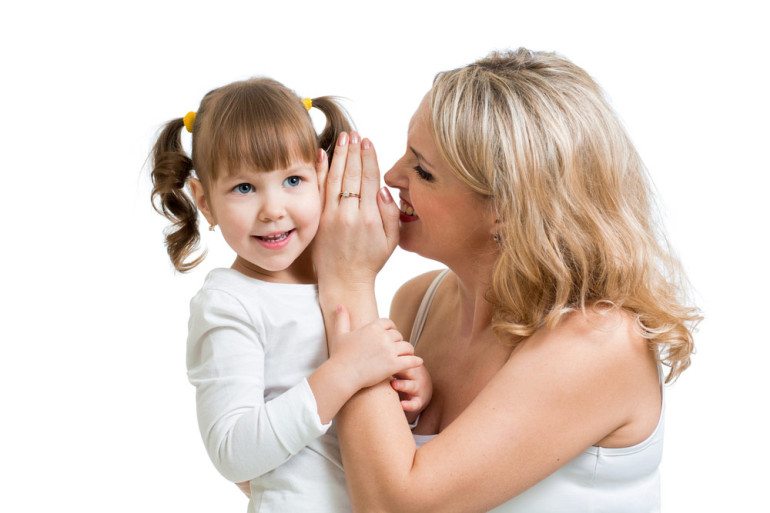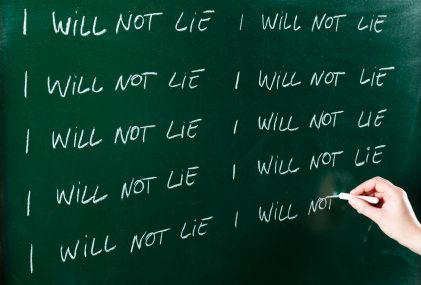Children’s Lying. Turns Out, We Teach Them How!
Tags: lying, modeling, preschoolers
 Honesty is rated as one of the most desirable qualities that parents hope to hone in their children. Honesty stands significantly above confidence and good judgement when parents are surveyed. You can imagine then, how upset parents get when their child lies. I like to comfort parents by letting them know it’s not really a sign of moral bankruptcy, but rather a sign of intelligence! You have to be bright to lie. It’s also developmental. Most children will discover and experiment with telling a lie to avoid being punished by about age four. “I didn’t break the lamp” they claim. Seems they are not very good at lying at this age though. They’ll attempt this bald face lie even when they know you saw them knock the lamp over.
Honesty is rated as one of the most desirable qualities that parents hope to hone in their children. Honesty stands significantly above confidence and good judgement when parents are surveyed. You can imagine then, how upset parents get when their child lies. I like to comfort parents by letting them know it’s not really a sign of moral bankruptcy, but rather a sign of intelligence! You have to be bright to lie. It’s also developmental. Most children will discover and experiment with telling a lie to avoid being punished by about age four. “I didn’t break the lamp” they claim. Seems they are not very good at lying at this age though. They’ll attempt this bald face lie even when they know you saw them knock the lamp over.
Some children will lie to gain social status. When I was a nursery school teacher, one boy shared at carpet time that his mom was having baby. We all got very excited for him and I congratulated his mom on her pregnancy when she arrived at pick-up time. You should have seen the look of shock in her eyes! “Pregnant? Me? NO!” When you are in nursery school, a lie can get you in the lime light at carpet time and make you feel like a star in the moment. Maybe you aren’t having a baby, or going to Disney or getting a new puppy, but who cares! Everyone is asking you questions and excited for you! Ride the high!
Children might lie in the form of cheating, claiming they rolled a five and landed on Parking Lot so they win all the Monopoly money on the board. If a child feels they can’t win through skill or fair means, they may learn to ensure their win by cheating. That also gives us insight into how much they value winning and being better than others. It reveals how much they will risk to protect themselves and their egos from failing (aka losing the game).
While lying does begin around age four and will be experimented with until about age six, it seems that peers socialize children to give it up. Once it costs them socially, children abandon it. If their friends don’t like them lying, your child will stop to keep their friendship. However, if your child is still lying regularly by age seven, research seems to say they are hooked and these often become life long liars.
What I found so interesting about the lying research, is that it’s actually parents who teach their children to lie. GULP! Yes, that is right. We teach them with “white lies”. Let me explain.
How many of you wanted your child to be polite at Christmas by acting like they liked a gift, even if they didn’t? We teach our children to be polite and to think of the feelings of others. We teach them to lie in order to make the other person feel emotionally okay. The trouble is, children generalize this rule to mean they should use lying to avoid conflict and keep things smooth sailing in relationships. When dad asks his son “Did you use your allowance to buy those yugioh cards?” his son doesn’t want to upset his dad and so he applies the white lie rule he learned at Christmas and says “no – I found them”. Children can’t see the nuanced difference.
Adults white lie their way out of conflict all the time and they model this to children. Instead of saying to your mother-in-law “Our weekend is looking too busy already, I know you are disappointed but we can’t come see you this time” we say the lazy alibi “we can’t come because Amy has a cold” which is less likely to get push back. In fact, research shows that adults white lie in one out of every five social interactions, or in other measures – about once a day.
So how do we take all this information and do something useful with it? Well, lets start by watching our own behaviour. Let’s catch ourselves in our white lies and notice them for what they are: taking the psychologically easy way out. Instead, let’s get better at saying it like it really is and handling the potential conflict, hurt or upset that may unfold. This doesn’t mean you have to be rude. It means you have to face the music. Change always begins with awareness. Start there.
Next – don’t punish your children. Find other discipline techniques for teaching such as logical consequences. If they broke the lamp, the consequence is that they need to clean up the mess ( with your supervision if there is glass) and replace the lamp with their own money. Perhaps you feel that they should lose their privilege of playing in that room for a day too. Or maybe you have them share with you how they plan to play in that room with breakables and not hurt your personal property. When they have a plan in place they can use the room again. My examples of disciplinary action focus on learning and personal responsibility, not on creating pain and shame.
Don’t set your children up for lies by asking about things you know. Why say “did you break the lamp?” if you know they broke it? Instead, simply say “I see you broke the lamp. What do you think needs to happen now?”
If your child cheats at a board game and you notice it – call them out on it by offering to end the game, saying “I don’t enjoy games when people cheat. If people cheat, I am going to stop playing.” If it happens a second time, quietly remove your game piece from the board and say ” I am not interested in this game. Let try again another time”. Too often parents let a cheat slide, thinking “whatever, they need the advantage, or I don’t want to be mean. Some parents think it’s even cute. It’s not. If they experience success with their lying they will continue using lying as a strategy.
And here is the last piece of advice. Research shows that it is more effective in changing children’s behaviour if you discuss the merits and benefits of being trustworthy rather than if you talk about why lying is bad. If you are reading books with your children or watching TV or movies where someone is being truthful and honest – point out how helpful and honourable that is. Discuss how much more you can trust and be safe with someone who is honest and how that leads to better relationships. Let them know you think it is a very special quality they should be proud of! Believe me – children move in line with your expectations. If you call them a liar you’ll create one. If you notice them being honest and truthful, you’ll see them doing it more.
( For more discussion about lying, catch my interview with Diane Flacks on CBC radio’s Definitely Not The Opera or more affectionately, “DNTO” Saturday January 20th 2013. )



2 Responses to “Children’s Lying. Turns Out, We Teach Them How!”
Melissa
Hi Alyson, how do you recommend handling lying & stealing? My daughter (4) has come home a few times from school with little items she says her friends have given her, but her reaction when I ask her about them suggests she has snuck them out of friends’ cubbies when no one is looking. She once came home with a my little pony with an elaborate story that the teacher had given all the girls my little ponies and all the boys hot wheels. After pressing she admitted it was one of her friends. This past weekend she actually took something from a store and after we’d left showed it to me and told me that she just found it on the ground and then later admitted she had taken it. I’m at a loss for what to do.
alyson
There are several reasons kids can lie – reasons that serve a purpose. Claiming your mom is having a baby when she isn’t could be a way of impressing peers in the nursery room for example. In your case, your daughter is taking things and lying about how she acquired them, which leads me to believe she doesn’t have a way to get things through proper roots. I would start her on a small allowance so that if she wants a pony, she can buy one for herself with real money. The allowance doesn’t need to be much but its a symbol of how to do things the just way.